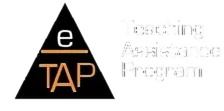Standardized Test Preparation
ACT
Language Arts
Assessment Exam - ACT English| Usage/Mechanics | eTAP Lesson |
|---|---|
| The items in this category test the student’s knowledge of the conventions of internal and end-of-sentence punctuation, with emphasis on the relationship of punctuation to meaning (for example, avoiding ambiguity, indicating appositives). | |
| Internal Punctuation
ACT.Eng.1.1.a |
Mechanics of Writing |
| End of Sentence Punctuation
ACT.Eng.1.1.b |
Period/Exclamation Point/Question Mark Direct Variation |
| Punctuation for Avoiding Amibuity
ACT.Eng.1.1.c |
Understand Sentence Construction |
| Punctuation for Indicating Appositives
ACT.Eng.1.1.d |
Understand Sentence Construction |
| The items in this category test the student’s understanding of agreement between subject and verb, between pronoun and antecedent, and between modifiers and the words modified; verb formation; pronoun case; formation of comparative and superlative adjectives and adverbs; and idiomatic usage. | |
| Agreement Between Subject and Verb
ACT.Eng.1.2.a |
Parts of Speech |
| Agreement Between Pronoun and Antecedent
ACT.Eng.1.2.b |
Pronouns |
| Agreement Between Modifiers and Words Modified
ACT.Eng.1.2.c |
Modifiers Using Active Voice |
| The items in this category test the student’s understanding of relationships between and among clauses, placement of modifiers, and shifts in construction. | |
| Relationships Between and Among Clauses
ACT.Eng.1.3.a |
Identify Correctly Used Clauses |
| Placement of Modifiers
ACT.Eng.1.3.b |
Revise Text to Highlight the Individual Voice, Improve Sentence Variety and Style |
| Shifts in Sentence Construction
ACT.Eng.1.3.c |
Write Persuasive Compositions |
| Rhetorical Skills | eTAP Lesson |
| The items in this category test the student’s ability to develop a given topic by choosing expressions appropriate to an essay’s audience and purpose; to judge the effect of adding, revising, or deleting supporting material; and to judge the relevancy of statements in context. | |
| Develop a Given Topic by Choosing Expressions Appropriate to an Essay’s Audience and Purpose
ACT.Eng.2.1.a |
Elements of Discourse |
| Judge the Effect of Adding, Revising, or Deleting Supporting Material
ACT.Eng.2.1.b |
Structure and Format of Functional Documents |
| Judge the Relevancy of Statements in Context
ACT.Eng.2.1.c |
Literal and Figurative Meaning of Words |
| The items in this category test the student’s ability to organize ideas and to choose effective opening, transitional, and closing sentences. | |
| Organize Ideas
ACT.Eng.2.2.a |
Logical Patterns of Organization |
| Choose Effective Opening, Transitional and Closing Sentences
ACT.Eng.2.2.b |
Appropriate Manuscript Requirements |
| The items in this category test the student’s ability to select precise and appropriate words and images, to maintain the level of style and tone in an essay, to manage sentence elements for rhetorical effectiveness, and to avoid ambiguous pronoun references, wordiness, and redundancy. | |
| Select Precise and Appropriate Words and Images
ACT.Eng.2.3.a |
How to Achieve Clarity, Force, and Aesthetic Effect |
| Maintain the Level of Style and Tone in an Essay
ACT.Eng.2.3.b |
Essay Structure |
| Manage Sentence Elements for Rhetorical Effectiveness
ACT.Eng.2.3.c |
How to Reach Rhetorical or Aesthetic Purposes |
| Avoid Ambiguous Pronoun References, Wordiness, and Redundancy
ACT.Eng.2.3.d |
Effective and Interesting Language |
| Literary Narrative or Prose Fiction | eTAP Lesson |
| Passages From Short Stories, Novels, Memoirs, and Personal Essays
ACT.Eng.3.1.a |
Fictional and Autobiographical Narratives Prose |
| Prose Passages From Short Stories and Novels
ACT.Eng.3.1.b |
Elements of Plot |
| Social Studies | eTAP Lesson |
| Passages on Anthropology or Archaeology
ACT.Eng.3.2.a |
Mesopotamian Empires |
| Passages on Biography
ACT.Eng.3.2.b |
Write Biographical or Autobiographical Narratives |
| Passages on Bussiness and Economics
ACT.Eng.3.2.c |
Scarcity and Choice |
| Passages on Education
ACT.Eng.3.2.d |
New England Colonies |
| Passages on Geography, History and Political Science
ACT.Eng.3.2.e |
The Mayan Civilization The Triumph of Reason |
| Passages on Psychology and Sociology
ACT.Eng.3.2.f |
Aesthetic Effects of a Media Presentation Develop Presentations Using Appropriate Research Methods |
| Humanities | eTAP Lesson |
| Passages From Memoirs and Personal Essays
ACT.Eng.3.3.a |
Write Responses to Literature |
| Passages on Architecture and Art
ACT.Eng.3.3.b |
Quest for Beauty and Meaning |
| Passages on Dance, Music, and Theatre
ACT.Eng.3.3.c |
Traditions in Art, Music & Literature |
| Passages on Film, Television and Radio
ACT.Eng.3.3.d |
Strategies Used by the Media |
| Passages on Ethics and Philosophy
ACT.Eng.3.3.e |
Western Law and its Influences |
| Passages on Language and Literary Criticism
ACT.Eng.3.3.f |
Evaluation of Aesthetic Qualities |
| Natural Science | eTAP Lesson |
| Passages on Anatomy, Biology, Botany, Medicine, Microbiology, Physiology, and Zoology
ACT.Eng.3.4.a |
Fossil Analysis Organism Populations |
| Passages on Chemistry
ACT.Eng.3.4.b |
Concentration, Temperature and Pressure |
| Passages on Ecology, Geology, Meteorology, and Natural History
ACT.Eng.3.4.c |
How Has Earth's Climate Changed Over Time? Geological Regions and Resources |
| Passages on Astronomy and Physics
ACT.Eng.3.4.d |
Applying Forces to an Object (Newton's 3rd Law) Where is the Solar System? |
| Passages on Technology
ACT.Eng.3.4.e |
Tools and Technology Trends in Labor |


